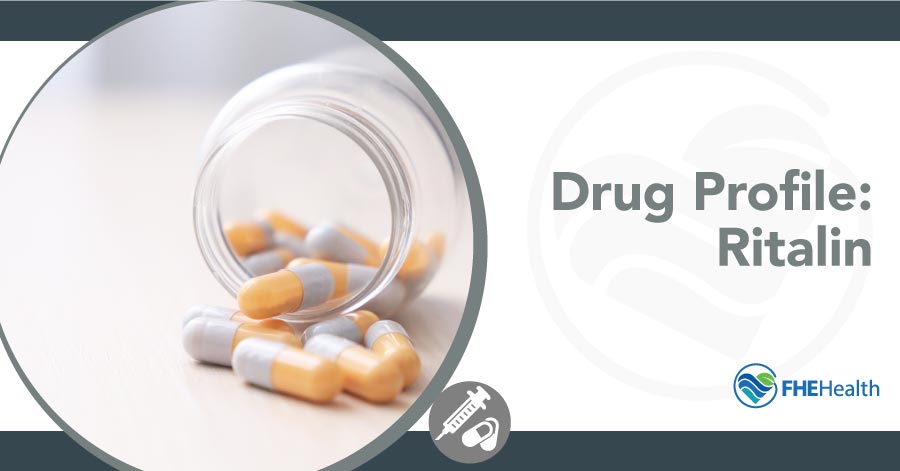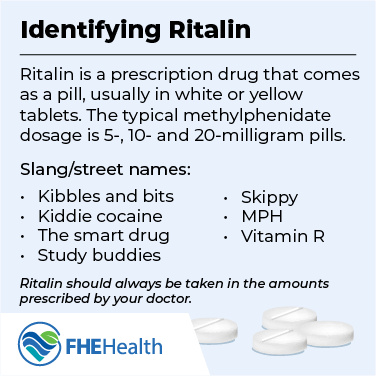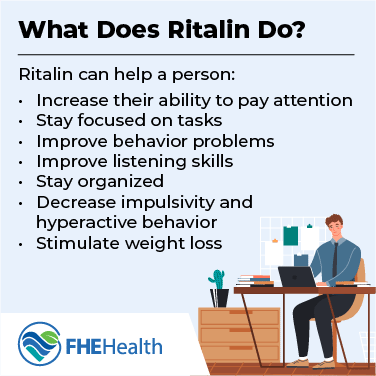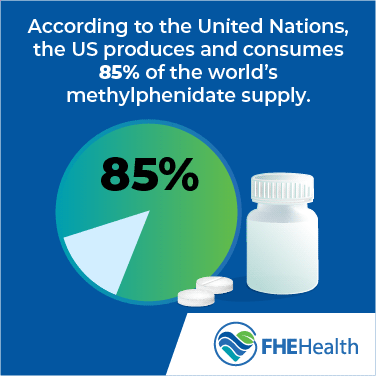
Ritalin is the brand name of methylphenidate, a type of drug mainly used to treat attention deficit hyperactivity disorder (ADHD) in kids and adults. This drug is incredibly effective at calming individuals down and helping them focus on tasks. In recent years, it’s been suggested that ADHD-treating prescription drugs like Ritalin and Adderall are being overly prescribed and abused in society. More specifically, a “Ritalin explosion” started in 1991 and continues today in which Ritalin is overprescribed to kids who aren’t suffering from ADHD but simply have healthy levels of energy.
At the same time, Ritalin is incredibly popular among college kids (ages 18-25) who want to focus on schoolwork. It’s imperative to get the Ritalin dosage correct to ensure it’s working as it should and not being abused. If misused, individuals can start to build up a tolerance, require a larger Ritalin dosage and find themselves with a serious problem.
Identifying Ritalin
 Ritalin is a prescription drug that comes as a pill, usually in white or yellow tablets. The typical methylphenidate dosage for these tablets is 5-, 10- and 20-milligram pills.
Ritalin is a prescription drug that comes as a pill, usually in white or yellow tablets. The typical methylphenidate dosage for these tablets is 5-, 10- and 20-milligram pills.
Ritalin has many slang or street names, such as:
- Kibbles and bits
- Kiddie cocaine
- The smart drug
- Study buddies
- Skippy
- MPH
- Vitamin R
Wondering how to take Ritalin correctly? The proper way to take this medication is orally, often 30-45 minutes before a meal. However, those with stomach problems are encouraged to take their pill with food.
Ritalin should always be taken in the amounts prescribed by your doctor, as overuse can lead to habit-forming behavior. Individuals abusing the drug may crush and snort the pill to get high and experience a powerful, more immediate effect. The tablets can also be dissolved and injected, but this isn’t a popular method as it’s reported it doesn’t produce as strong a high.
Ritalin isn’t recommended for children under the age of 6.
What Does Ritalin Do?
 Ritalin is a type of central nervous system (CNS) stimulant medication. It’s primarily used to treat ADHD but can also be prescribed to treat narcolepsy. The drug can help a person:
Ritalin is a type of central nervous system (CNS) stimulant medication. It’s primarily used to treat ADHD but can also be prescribed to treat narcolepsy. The drug can help a person:
- Increase their ability to pay attention
- Stay focused on tasks
- Improve behavior problems
- Improve listening skills
- Stay organized
- Decrease impulsivity and hyperactive behavior
- Stimulate weight loss
The striatum is the region of the brain that helps control people’s motivation, cognition and action. Methylphenidate increases the amount of dopamine released in the striatum, improving a person’s motivation.
A doctor will prescribe Ritalin to treat ADHD or narcolepsy. Typically, adults are told to take the prescription drug two or three times throughout the day. Ritalin is most effective if people continue to take it regularly and at the same time every day. Depending on your reaction to the drug’s effects, your doctor may recommend increasing or decreasing your dosage.
If used in larger-than-prescribed dosages, Ritalin can produce a “high,” making people feel excited and alert.
The typical half-life of methylphenidate is 1-4 hours, depending on the person and their tolerance level. This relatively short half-life is why most doctors suggest their patients take Ritalin between two and three times daily so they can feel the effects of the drug throughout the day. However, while the effects may subside after a few hours, Ritalin stays in your body a bit longer. A urine or saliva test can pick up traces of Ritalin 1-3 days after use.
Ritalin Dosage & Addiction
 So, how much Ritalin is too much? Anything more than the amount prescribed by your doctor. You may find you build up a tolerance and your doctor may increase the number of milligrams you’re taking, but they’ll do so with careful monitoring. The proper Ritalin dosage for adults is one that helps reduce the symptoms of their ADHD without producing a high so that the individual can function normally throughout the day.
So, how much Ritalin is too much? Anything more than the amount prescribed by your doctor. You may find you build up a tolerance and your doctor may increase the number of milligrams you’re taking, but they’ll do so with careful monitoring. The proper Ritalin dosage for adults is one that helps reduce the symptoms of their ADHD without producing a high so that the individual can function normally throughout the day.
If taken in prescribed dosages, Ritalin is considered not habit-forming. However, once individuals start to take the drug in larger-than-prescribed dosages, there’s a serious risk of addiction.
The high the drug produces in larger quantities, plus its ability to make people more productive, has made it a popular drug with college students. One survey at a liberal arts college found that more than 16% of students had taken methylphenidate recreationally at some point, and 12.7% had tried snorting it. More widespread and accurate data on Ritalin abuse among college students is impossible to pinpoint, as this drug is shared and passed around recreationally from someone with a legitimate prescription to others.
And it doesn’t stop with college students. In a 2016 national parenting survey, it was reported that more than 6.1 million children in the United States had been diagnosed with ADHD, for which Ritalin is a leading treatment. Unfortunately, even individuals who’ve been prescribed Ritalin by their doctor can develop an addiction. It’s not uncommon to build up a tolerance to the drug, in which case more and more is needed to achieve the same results.
According to the United Nations, the United States produces and consumes 85% of the world’s methylphenidate supply. It’s clear that this drug is rampant throughout the country and is likely being abused by many groups.
When someone develops an addiction to methylphenidate, there can be physical, psychological and behavioral symptoms. Some signs of short-term and long-term Ritalin abuse that can help you identify that someone has a Ritalin addiction are:
- Anxiety
- Irritability
- Reduced appetite
- Increased heart rate and blood pressure
- Dehydration
- Panic attacks
- Feelings of suspicion and paranoia
- Headaches
- Insomnia
- Nausea
- Seizures
- Hallucinations
If Ritalin is abused for long periods, some more serious effects can occur, such as:
- Depression
- Weight loss
- Liver, kidney and lung damage
- Permanent blood vessel damage in the heart and brain
- Increased risk of heart attacks, stroke and death due to the high blood pressure
- Increased risky behavior to try to secure more pills
- Potential for overdose from taking a high Ritalin dosage
Ritalin Withdrawal and Treatment
While it’s not intended for any patient to use Ritalin forever, many people become dependent on the drug and use it for several years. Individuals shouldn’t suddenly stop taking Ritalin altogether, as there’s a risk of withdrawal symptoms, such as depression, suicidal thoughts and mood changes. Instead, if you wish to stop taking the drug, you and your doctor can work on a plan where you gradually reduce your dosage.
If you’ve developed an addiction to the drug, you can significantly benefit from enrolling in a rehabilitation program. Note that many drugs don’t require a particular detox but still require medical and psychiatric help to stop taking them. A professional program can help individuals:
- Manage and monitor their withdrawal symptoms (so they never become life-threatening)
- Receive treatment for any co-occurring mental health conditions that contributed to their abuse of Ritalin
- Learn healthy coping mechanisms to handle temptations and avoid relapse
FHE Health Helps Individuals Overcome Their Ritalin Addiction
If you or someone you know is struggling with a Ritalin addiction, know that FHE Health can be a source of help. Ritalin abuse is common, but it doesn’t have to take over your life. Our top rehabilitation facility specializes in drug and mental health treatment that uses a patient-first approach. Get connected with one of our counselors who are on call 24/7 by calling (833) 596-3502.






